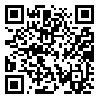دوره 10، شماره 1 - ( 6-1403 )
جلد 10 شماره 1 صفحات 28-21 |
برگشت به فهرست نسخه ها
Ethics code: IR.USWR.REC.1402.228
Download citation:
BibTeX | RIS | EndNote | Medlars | ProCite | Reference Manager | RefWorks
Send citation to:



BibTeX | RIS | EndNote | Medlars | ProCite | Reference Manager | RefWorks
Send citation to:
Soltani A, Nikseresht M, Rajabpour M, Khoundabi B. The Knowledge of Safe Emergency Evacuation During an Earthquake Among the Residents of Tehran, Iran. Health in Emergencies and Disasters Quarterly 2024; 10 (1) :21-28
URL: http://hdq.uswr.ac.ir/article-1-604-fa.html
URL: http://hdq.uswr.ac.ir/article-1-604-fa.html
The Knowledge of Safe Emergency Evacuation During an Earthquake Among the Residents of Tehran, Iran. فصلنامه سلامت در حوادث و بلایا. 1403; 10 (1) :21-28
چکیده: (2755 مشاهده)
Background: Earthquake is a natural disaster that threaten large parts of Iran. In addition to the preparedness of relief organizations, people should know how to protect themselves from possible damages. Tehran, the capital of Iran, is prone to earthquakes and citizens’ preparedness for possible earthquakes should be improved. This study aims to measure the safe emergency evacuation knowledge of citizens in Tehran, in case of an earthquake.
Materials and Methods: This is a cross-sectional study that was conducted on 602 residents of Tehran (all 22 districts) aged ≥15 years in 2022. Data were collected using a researcher-made questionnaire with acceptable validity and reliability to measure the knowledge of safe placement and safe evacuation.
Results: The mean knowledge score of citizens was 8.8 out of 20. The knowledge score was significantly higher in women than in men, in people under the age of 64, in those with higher level of education, in students/housekeepers and employed people, in people who had received relevant information from the educational programs prepared by the municipality and educational textbooks, and in those living in privileged urban areas. Nearly 25% of people had not received any education related to earthquake. Radio/TV programs and educational textbooks were the most common sources of information.
Conclusion: There is a need to improve the knowledge of safe emergency evacuation during an earthquake among the residents of Tehran. In addition to formal education in schools/universities, citizens need appropriate training courses in other centers with the help of social media. Planning in this area should be attractive to motivate citizens to acquire more disaster knowledge.
Materials and Methods: This is a cross-sectional study that was conducted on 602 residents of Tehran (all 22 districts) aged ≥15 years in 2022. Data were collected using a researcher-made questionnaire with acceptable validity and reliability to measure the knowledge of safe placement and safe evacuation.
Results: The mean knowledge score of citizens was 8.8 out of 20. The knowledge score was significantly higher in women than in men, in people under the age of 64, in those with higher level of education, in students/housekeepers and employed people, in people who had received relevant information from the educational programs prepared by the municipality and educational textbooks, and in those living in privileged urban areas. Nearly 25% of people had not received any education related to earthquake. Radio/TV programs and educational textbooks were the most common sources of information.
Conclusion: There is a need to improve the knowledge of safe emergency evacuation during an earthquake among the residents of Tehran. In addition to formal education in schools/universities, citizens need appropriate training courses in other centers with the help of social media. Planning in this area should be attractive to motivate citizens to acquire more disaster knowledge.
نوع مقاله : پژوهشي |
موضوع مقاله:
ارزیابی خطر
دریافت: 1402/11/16 | پذیرش: 1403/1/27 | انتشار: 1403/7/10
دریافت: 1402/11/16 | پذیرش: 1403/1/27 | انتشار: 1403/7/10
| بازنشر اطلاعات | |
 |
این مقاله تحت شرایط Creative Commons Attribution-NonCommercial 4.0 International License قابل بازنشر است. |





